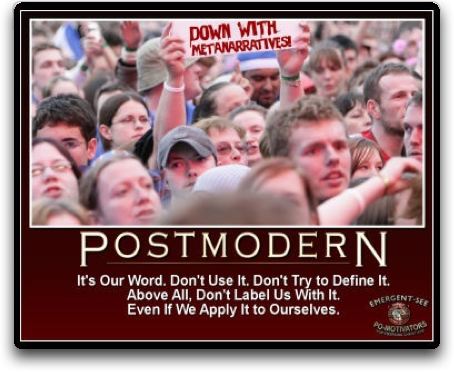
Postmodernism, in all its vicious variations, is a term devoid of any real content, and for this reason dictionaries and philosophy dictionaries offer very little help in defining it.
And yet postmodernism has today become almost universally embraced as the dominant philosophy of science — which is the primary reason that science crumbles before our eyes under its corrupt and carious epistemology.
Postmodernism, like everything else, is a philosophical issue. Accordingly, postmodernism’s tentacles have extended into every major branch of philosophy — from metaphysics, to epistemology, to esthetics, to ethics, to politics, to economics.
In order to get any kind of grasp on postmodernism, one must grasp first that postmodernism doesn’t want to be defined. Its distinguishing characteristic is in the dispensing of all definitions — because definitions presuppose a firm and comprehensible universe.
You must understand next that postmodernism is a revolt against the philosophical movement that immediately preceded it: Modernism.
We’re told by postmodernists today, that modernism and everything that modernism stands for is dead.
Thus, whereas modernism preached the existence of independent reality, postmodernism preaches anti-realism, solipsism, and “reality” as a term that always requires quotation marks.
Whereas modernism preached reason and science, postmodernism preaches social subjectivism and knowledge by consensus.
Whereas modernism preached free-will and self-governance, postmodernism preaches determinism and the rule of the collective.
Whereas modernism preached the freedom of each and every individual, postmodernism preaches multiculturalism, environmentalism, egalitarianism by coercion.
Whereas modernism preached free-markets and free-exchange, postmodernism preaches Marxism and its little bitch: statism.
Whereas modernism preached objective meaning and knowledge, postmodernism preaches deconstruction and no-knowledge — or, if there is any meaning at all (and there’s not), it’s subjective and ultimately unverifiable.
In the words of postmodernism’s high priest Michel Foucault: “It is meaningless to speak in the name of — or against — Reason, Truth, or Knowledge.”
Why?
Because according to Mr. Foucault again: “Reason is the ultimate language of madness.”
We can thus define postmodernism as follows:
It is the philosophy of absolute agnosticism — meaning: a philosophy that preaches the impossibility of human knowledge.
What this translates to in day-to-day life is pure subjectivism, the ramifications of which are, in the area of literature, for example, no meaning, completely open interpretation, unintelligibility.
Othello, therefore, is as much about racism and affirmative action as it is about jealousy.
Since there is no objective meaning in art, all interpretations are equally valid.
Postmodernism is anti-reason, anti-logic, anti-intelligibility.
Politically, it is anti-freedom. It explicitly advocates leftist, collectivist neo-Marxism and the deconstruction of industry, as well as the dispensing of inalienable rights to property and person.
There is, however, a deeply fatal flaw built into the very premise of postmodernism, which flaw makes postmodernism impossible to take seriously and very easy to reject:
If reason and logic are invalid and no objective knowledge is possible, then the whole pseudo-philosophy of postmodernism is also invalidated.
One can’t use reason to prove that reason is false.
